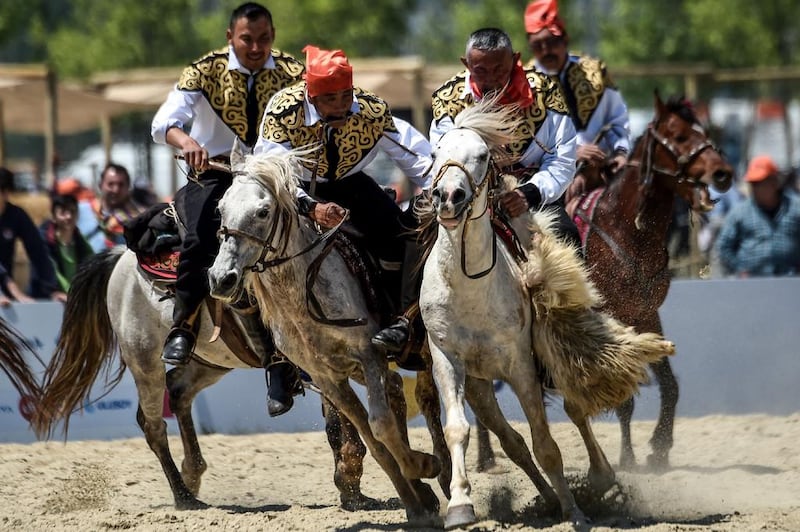ISTANBUL // Brandishing their javelins and letting out a bloodcurdling war cry, the Ottoman horsemen charge at a thunderous gallop.
Suddenly one is hit and thrown from his horse – making dozens of children gasp as they film the scene on their smartphones.
It may be 2017, but Istanbul rolled back the years last weekend with the Ethnic Sports Cultural Festival (EKF), which aims to promote the sports practised by modern Turks’ ancestors – from the nomadic horsemen of Central Asia to the Janissaries, the elite troops of the Ottoman empire.
More than 800 athletes took part in traditional sports from Anatolia and Central Asia which president Recep Tayyip Erdogan’s government wants to develop to celebrate the glory days of Turkey’s past.
The cavalry were taking part in “cirit”, a riding sport created in Central Asia in which riders throw wooden javelins at the opposing team’s horsemen.
“This is the king of sports, it embodies the Turkish spirit,” said Erdem, 32, after dismounting.
The festival is part of Mr Erdogan’s efforts to revive Turkey’s Ottoman roots after decades of a westernisation drive following the collapse of the empire.
The modern Turkish republic was founded in 1923 after over 600 years of Ottoman rule.
“We want to revive our traditional values, beginning with our sports, in order to move forward with these values,” Bilal Erdogan, one of the president’s sons and an archery fan who is also EKF’s sponsor, said.
A huge area on the European side of Istanbul usually used for political rallies was transformed into an Ottoman encampment for the four-day event.
Wresters, archers and riders showed off their skills in between traditional cooking workshops, Central Asian dancing and carpet-weaving.
Born of the wars that shaped Ottoman life and forged an empire that stretched from the Balkans to the Gulf, most of these traditional sports died when the old order fell after the First World War.
Their survival today is due in large part to families passing the traditions from one generation to the next.
Turkish sports minister Akif Cagatay Kilic promised the government would provide further financial support to develop such activities and suggested it would encourage clubs to show more interest in traditional sports.
Traditional Turkish wrestling champion Sadi Bakir – bare-chested and covered in oil – said “interest in the sport has increased in recent times and the state is investing more effort in this field”.
As a result, he said, “at the last European [wrestling] championships, we won five gold medals. The past power of the Turks is re-emerging.”
Organisers said 800,000 people came to the festival, voicing hope that it would spark a passion for the sports in schoolchildren visiting with their classes.
“Some people may not realise the importance of what we are doing here today, but we will reap the fruits one day,” Bilal Erdogan said in his opening speech. “God willing, the 21st century will be ours.”
* Agence France-Presse





